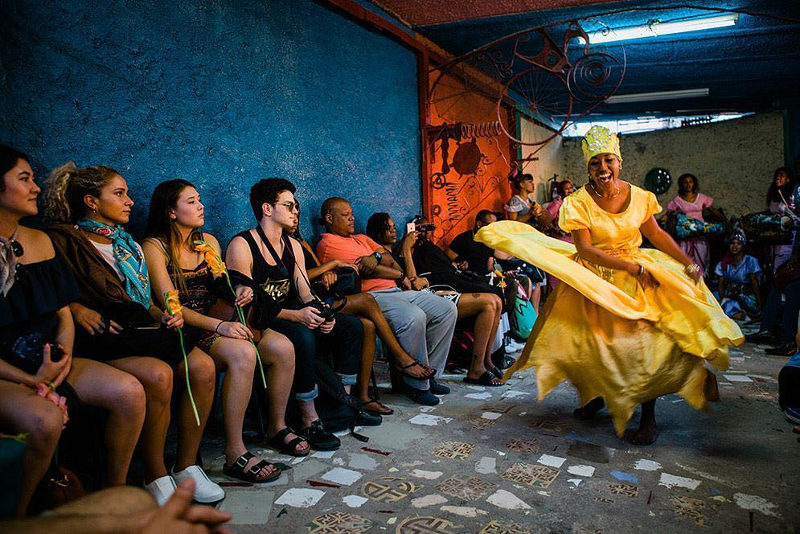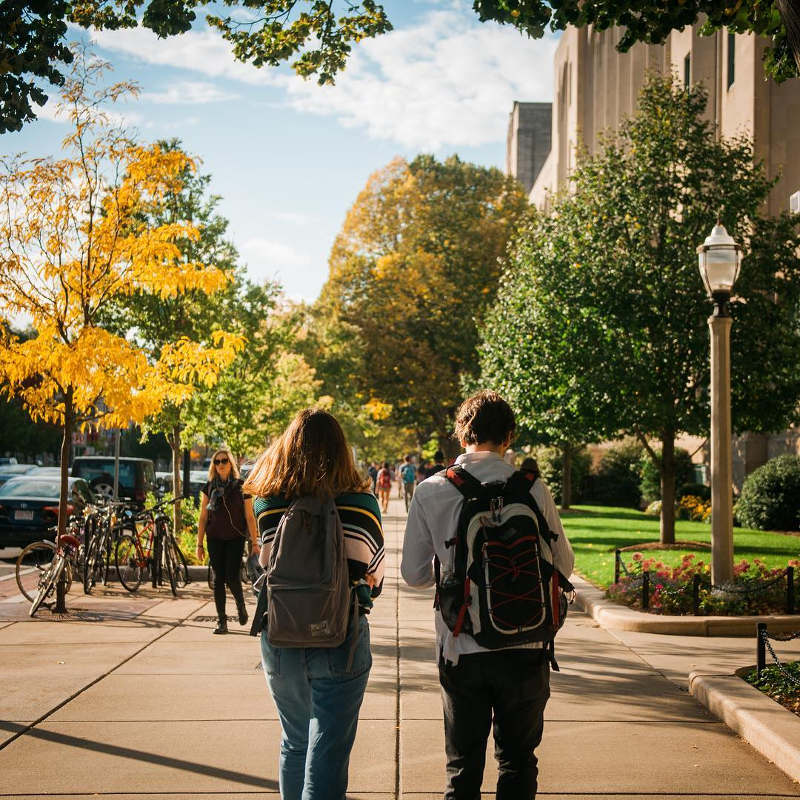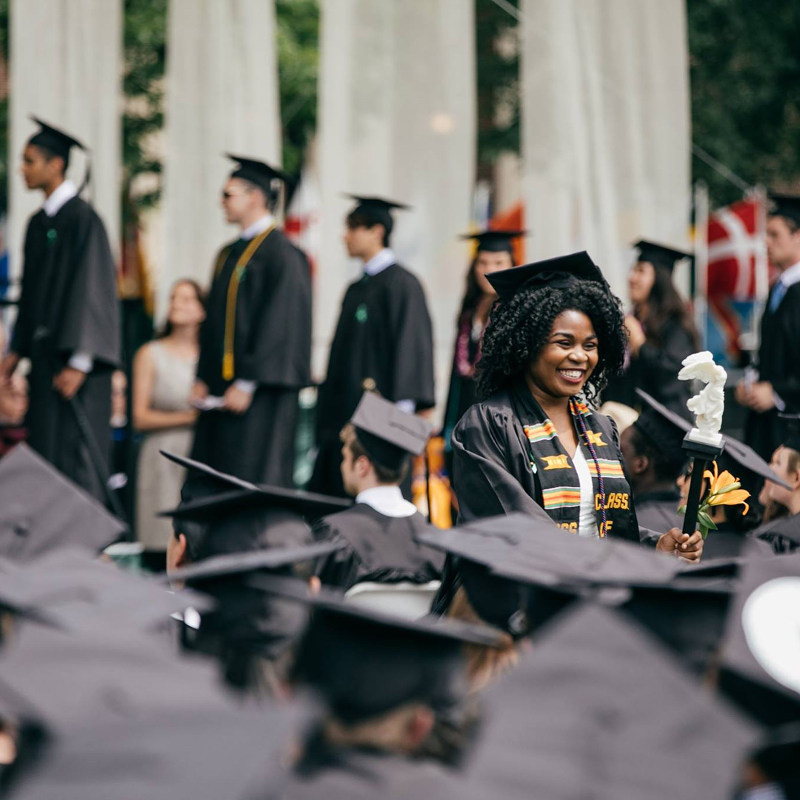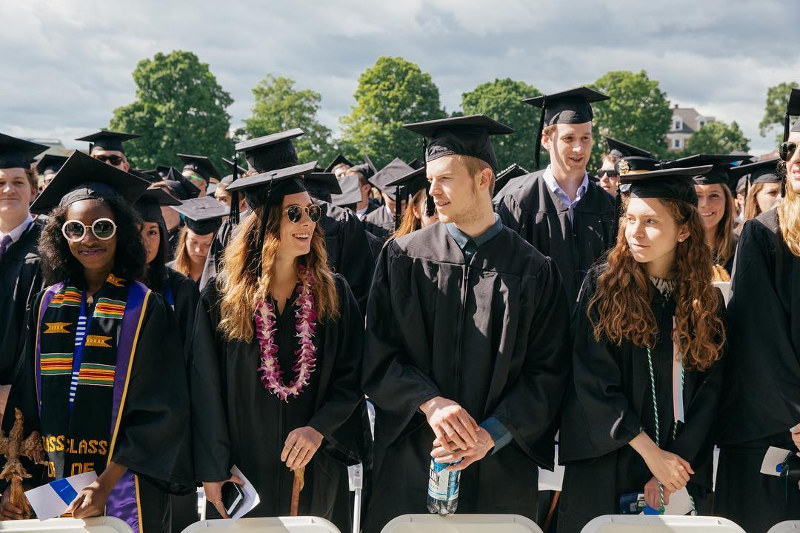
[Updated: February 2025]
Ever dreamed of being able to study abroad between the magnificent Gothic spires of Spain or amongst the indie music stores and vintage bookshops of Haight-Ashbury in San Francisco? Or maybe you daydream about exploring the Great Barrier Reef while studying marine biology in Australia or spending your time between classes visiting the Louvre Museum in Paris?
University and college are a cradle for education, unforgettable experiences, and revolutionary ideas. But studying abroad offers something even greater – an immersive experience that broadens your horizons and enriches your mind while allowing you to fulfil your academic and travel dreams.

So, wherever your academic interests may lie, this post offers a detailed guide on how it all works, so you can make your fantasies of studying abroad a reality!
What are the benefits of studying abroad?
90% of employers believe those with international accreditation possess desirable traits and skills such as maturity, superior communication skills, flexibility, cross-cultural awareness, and independence.

However, apart from improving your career opportunities and giving you a chance to gain a deeper understanding of how the world works, there are a number of other benefits to studying abroad.
Studying abroad also:
- Encourages personal growth.
- Hones your language skills.
- Teaches you how to connect with people.
- Gives you a chance to discover new interests and undiscovered talents.
- Allows you to travel the world.
- Offers invaluable life experience.
Wherever you’re headed, get R1,000 off your flight with Travelstart+!
Where is the best place to study abroad?
In a world bursting at the seams with beautiful and interesting places, choosing where to study can be a daunting experience. Luckily, figuring this out usually begins with one simple question, “Where do you want to go?”.
If you enjoy the outdoors, the heavenly landscapes of Canada would provide an idyllic backdrop; while adventure seekers and surfing enthusiasts would find paradise in Portugal. On the other hand, a place like Amsterdam, with its artistic heritage and sexy nightlife, is a utopia for art lovers and party animals.
Once you have decided where you would like to go you will need to consider which city or country will enhance your degree or work experience.

For example, if you want to major in art history it would be better to study in a country with a notable history of art and thriving art culture, such as Italy. However, it is also important to choose a destination that will fit your budget in terms of living expenses (i.e. studying in Europe is significantly more expensive than studying in South America).
Other factors to take into account include language, culture, and climate. If you are a culture vulture and love spicy food and sultry weather, studying in a place like India would be a good fit for you; while South Korea would be a dream destination for aspiring game developers.
Can you study abroad for any major?
Yes. However, as with most universities, your major will determine how long and where you can study.

What are the requirements to study abroad?
Each country, university, and college will have their own set of prerequisites and entry requirements. The application processes and requirements for undergraduate and postgraduate degrees also vary considerably.
- For undergraduate degrees, you will need to complete international entrance exams to supplement your academic record, as the South African matric qualification usually isn’t enough. You may need to complete several of these and other tests that are specific to that country and its education system.
- For postgraduate degrees (masters and PhD), you will need to have completed a four-year honours degree to qualify to study abroad. You will also need to write entrance exams that are course specific.
Some of the most important exams include the SAT, MCAT, LSAT, GMAT, GRE, IELTS, and TOEFL.

If you are considering studying in a country where English is not the spoken language there may be additional language requirements (i.e. some universities in Germany and France only accept students who are fluent in German and French).
You will also need to prove that you are able to support yourself financially while studying. This is especially important if your visa or programme does not allow you to work (i.e. Cambridge University does not allow students to work while studying).

Do you need a student visa to study abroad?
A student visa is required for most countries. The best resource is to consult the embassy website of the country you’re applying to or speak to a student counsellor at your chosen university to find out about visa requirements.
Note: In most cases, you will not be allowed to apply for a student visa until you have received a letter of acceptance from your chosen university or college.

How can I study abroad?
There are several options when it comes to studying abroad: Traditional programmes through your university, third-party providers such as Education USA and Global Education, or direct enrollment through the university overseas.
How much does it cost to study abroad?
Although there is no set figure, as costs vary from university to university, estimated costs can be anything from R 14 643 to R 664 740* for a full academic year (tuition only). Of course, these costs can vary dramatically from country to country, as tuition to a college in India would be much lower than tuition at a university in Switzerland.

Is it more expensive to study abroad?
Not necessarily. If you want to study medicine at Columbia University or law at Harvard, it will certainly cost a lot more than studying at UCT or Wits. However, with so many great colleges and universities around the world and a number of funding options, it is possible to study abroad without it costing the earth.
How can you afford to study abroad?
There are several options when it comes to funding your studies abroad. These include student loans, financial aid, bursaries, and scholarships.

How do I get a scholarship to study abroad?
Before applying for a scholarship, you will need to familiarise yourself with the kinds of scholarships that are available:
- Merit scholarships are usually awarded to students with exemplary academic (or athletic) results and a great record of participation in school or community activities.
- Student-specific scholarships are usually awarded to students from minority groups or disadvantaged backgrounds, based on factors such as race, gender, religion, and family background.
- Destination-specific scholarships are government scholarships that are awarded to students planning to pursue a study-abroad programme in that country. These scholarships act as an incentive to encourage students to study in that particular country rather than somewhere else.
- Programme-specific scholarships are awarded by individual study-abroad programmes to students based on academic and personal achievements.
- Subject-specific scholarships are awarded by institutions or study-abroad programmes to students based on their field of study or major. These usually require students to enrol in specific courses or conduct subject-specific research while abroad.
Note: You will need to offer references and exceptional academic records to qualify for most scholarships.

Once you have familiarised yourself with the different types of scholarships you should find out if the government of your chosen country offers any scholarships or financial support to international students. If this is not an option, find out what scholarships, bursaries, grants, and funding options are available through local organisations, foundations, companies, universities, banks, and private donors.
Here is a list of some of the scholarships that are available for South African students wanting to study abroad:
- The Fulbright Program
- The Hubert H. Humphrey Fellowship Program
- The Chevening UK Scholarships
- The AU Emerging Global Leader Scholarship Program
- The Rhodes Scholarships
- Macquarie Vice-Chancellor’s International Scholarships
- Australian Awards Scholarships
- The Vanier Canada Graduate Scholarships
- The Commonwealth Scholarships
- First Rand Laurie Dippenaar Scholarship
Explore this list of South African bursaries to find one that suits you!

How can I get a student loan to study abroad?
Nedbank offers student loans to postgraduate students wanting to study abroad.
Can international students apply for financial aid?
Financial aid is usually restricted to programmes in your home country. However, a number of foundations and organisations (public and private) offer financial aid in the form of grants, bursaries, and scholarships to international students.

Where can I study for free?
- Germany: a country of cutting-edge art and wild beer festivals. Public universities in Germany do not charge tuition for undergraduate students of any nationality. A fee to cover administration costs is applicable (this ranges between R 1800.00 and R 3200.00*) and students are responsible for their own living and travel costs. Find out how to study abroad in Germany here.
- France: a place of legendary culture and sun-drenched Mediterranean beaches. Public universities in France offer tuition for a fraction of the cost you would pay in South Africa (about R 2400.00* per year), or in some cases, for free. Students are responsible for their own living and travel costs. Find out how to study abroad in France here.
Note: Many of the courses are taught in the native language of that country, so there may be certain language requirements.

Can I work while studying abroad?
Whether you can work while studying abroad will depend on the limitations of your student visa and any restrictions laid out by your chosen university. Some student visas allow you to work for a certain number of hours per week, but some universities restrict students from working while studying.

How do you go about studying abroad?
- Apply to your chosen university or college and complete all the necessary entrance tests and exams.
- Find out if your credits can be transferred to your chosen university (if applicable).
- Get advice from students who have studied abroad.
- Find ways to finance your studies and living expenses abroad.
- Gather all the required documents.
- Go for a medical checkup and get all the necessary vaccinations.
- Get travel insurance.
- Seek out local connections.
- Find accommodation and set up a bank account in the country you will be living and studying in.
- Research local laws, social customs, and food and drink safety.

But before you jump on a plane bound for a strange and exotic country, it is important to decide if it is the right option for you. Being away from your family, friends, and everything that is familiar to you can be stressful and emotionally taxing and you need to be sure that you will be able to handle the pressure.
If it is for you, studying abroad is a passport to your dreams, so pack your bags, book your student flights, and get ready to experience the adventure of a lifetime!
“Twenty years from now you will be more disappointed by the things you didn’t do than by the ones you did do. So throw off the bowlines. Sail away from the safe harbor. Catch the trade winds in your sails. Explore. Dream. Discover.” – Mark Twain

*All published prices are subject to change without prior notice.
All information on this blog page was correct at the time of publishing and may change at any time without prior notice. Travelstart will not be held liable for loss or inconvenience resulting from the use of out-dated or incorrectly noted information.
Image credits:
seeka.scholarships via Instagram
dartmouthcollege via Instagram
bostonu via Instagram via Instagram
urochester via Instagram
kvdenn via Instagram
sunshinestories via Instagram
clairevlr via Instagram
teanabroad via Instagram

Hello. I currently live in South Africa and would like to pursue a career in America (etc). I want to apply to the University of Denver, which has a global score of #787. The University of Cape Town has a global score of #103. Therefore I want to ask if I’ll be better off getting a degree in South Africa, and then registering to work in America, or would it be better if I strive for a degree at the University of Denver, despite its global score being lower than UCT. I’m aware UCT is globally recognised, but would it be enough to allow me to work in America, or even worldwide? Or would it be better if I get a degree in the country in which I would like to work and someday live in?
Hi John,
Thanks for reaching out.
Best to look into the services offered by mainstream banks, such as the one you bank with. They can often provide the cheapest way of receiving money, wherever you are in the world.
Hi,
What is the safest or best way for a South African student to take money overseas to pay for living and study expenses?
Hi Getrude,
Thank you for reaching out to us. Please note that there are many university opportunities to study in the UK. I would like to commend you for wanting to further your studies and better yourself. In this day and age it can be very difficult. Please see the link with information on Studying in the UK as there are requirements which have to be met and you can search for a university that is the best fit for you https://www.internationalstudent.com/study_uk/education_system/entry_requirements/
HI
I am currently pursuing a degree in finance and would love to get my honors-phd in the UK however i am a average performing student kindly inform on possibilities of getting in and which institutions take south african students and also everything that’s required ,thank you
Hi Bulelwa,
Thanks for getting in touch.
Each country, university, and college will have their own set of prerequisites and entry requirements. The application processes and requirements for undergraduate and postgraduate degrees also vary considerably.
For undergraduate degrees, you will need to complete international entrance exams to supplement your academic record, as the South African matric qualification usually isn’t enough. You may need to complete several of these and other tests that are specific to that country and its education system.
For postgraduate degrees (masters and PhD), you will need to have completed a four-year honours degree to qualify to study abroad. You will also need to write entrance exams that are course specific.
You welcome to read through our blog: “”Everything you need to know about how to study abroad as a South African””
https://www.travelstart.co.za/blog/study-abroad/
For any further information we do suggest you contact the University and they should be able to point you in the right direct and answer any other questions you might have.
For loans, you would need to contact your bank and they should be able to assist.
Hi there
I’m a grade 10 student doing the following subjects….. mathematical literacy, Agricultural management practice, Agricultural technology and geography. I’m in a Agricultural school, but I’d love to go and study arts abroad. Is it possible, if not what what should I do in order to be able to study arts abroad? Also which university abroad costs about R10 000-R20 000 a year? And how can I find a sponsor that’ll sponsor my studies abroad?
Hi Dakalo,
Thanks for reaching out.
Each country, university, and college will have their own set of prerequisites and entry requirements. The application processes and requirements for undergraduate and postgraduate degrees also vary considerably.
For undergraduate degrees, you will need to complete international entrance exams to supplement your academic record, as the South African matric qualification usually isn’t enough. You may need to complete several of these and other tests that are specific to that country and its education system.
For postgraduate degrees (masters and PhD), you will need to have completed a four-year honours degree to qualify to study abroad. You will also need to write entrance exams that are course specific.
You welcome to read through our blog: “”Everything you need to know about how to study abroad as a South African””
https://www.travelstart.co.za/blog/study-abroad/
For any further information we do suggest you contact the University and they should be able to point you in the right direct and answer any other questions you might have.
For loans, you would need to contact your bank and they should be able to assist.
Hello, I want to study in Germany. The course I applied for is free but I need money as proof that I can finance myself, where can I get a loan for that
Hi Skyelar,
Thanks for getting in touch. Thanks for reaching out.
Each country, university, and college will have their own set of prerequisites and entry requirements. The application processes and requirements for undergraduate and postgraduate degrees also vary considerably. For this you will need to contact that university direct and they will advise accordingly.
Hi, I was wondering if this scholarship is accepted in Universities in Singapore?
Hi Khanyisa,
Thanks for reaching out.
Each country, university, and college will have their own set of prerequisites and entry requirements. The application processes and requirements for undergraduate and postgraduate degrees also vary considerably.
For undergraduate degrees, you will need to complete international entrance exams to supplement your academic record, as the South African matric qualification usually isn’t enough. You may need to complete several of these and other tests that are specific to that country and its education system.
For postgraduate degrees (masters and PhD), you will need to have completed a four-year honours degree to qualify to study abroad. You will also need to write entrance exams that are course specific.
You welcome to read through our blog: “”Everything you need to know about how to study abroad as a South African””
https://www.travelstart.co.za/blog/study-abroad/
For any further information we do suggest you contact the University and they should be able to point you in the right direct and answer any other questions you might have.
Hi
I finished my SA matric in 2019 and I have upgraded some of my subjects and currently not in any higher institution, but I would love to study medicine in Cuba next year. I wanna know if it will be possible due to me upgrading my marks and having finished my matric in 2019?
Hi there
Thanks for reaching out.
Each country, university, and college will have their own set of prerequisites and entry requirements. The application processes and requirements for undergraduate and postgraduate degrees also vary considerably.
For undergraduate degrees, you will need to complete international entrance exams to supplement your academic record, as the South African matric qualification usually isn’t enough. You may need to complete several of these and other tests that are specific to that country and its education system.
For postgraduate degrees (masters and PhD), you will need to have completed a four-year honours degree to qualify to study abroad. You will also need to write entrance exams that are course specific.
You welcome to read through our blog: “”Everything you need to know about how to study abroad as a South African””
https://www.travelstart.co.za/blog/study-abroad/
For any further information we do suggest you contact the University and they should be able to point you in the right direct and answer any other questions you might have.
Hi, my name is Risuna
I am currently doing grade 11 and I plan to study pharmacy. I want to do my postgraduate degree in Canada, Sweden, UK or Singapore how would I go about this? and what can I do now to increase my chances into getting accepted?
Hi Alwande,
Unfortunately, our quota has been filled. We financially support one main NGO called Thembalitsha which is very is close to our hearts. We also have a Charity Initiative within the company. The core of this initiative is to get employees involved in charitable activities.
We do wish you luck
Hi (I wrote this out once but I’m not sure if it went through so I’m going to re-do it just in case)
Hi, I’m a South African citizen finished matric in 2020,I applied for a university in Florida for Psychology (March 2021) and got accepted but I can’t afford it can you help?
Hi there,
Thanks for getting in touch and congratulations on being accepted.
For this you would need to contact AMDA direct as well as the American Embassy. They will advise what documents are required, the cost and the correct procedures to follow.
Hi there, I have been accapted to study at AMDA in the NY this semester but my fear is I am mot getting any scholarship. Please help I have documantation needed.
Hi Mudau,
Thanks for reaching out.
For this you would need to contact the University you would apply to study at for the most up to date information on their requirements.
hi I am Oritakadza
I am currently doing grade 10 and want to study medicine in the UK , am improving my grades at the moment also going to transition to a school that offers the examination required to study abroad . I wanted to know the average marks needed so that I can be accepted into a university
Hi Aliziwe,
Thanks for contacting us.
You welcome to read through our blog: “”Everything you need to know about how to study abroad as a South African””
https://www.travelstart.co.za/blog/study-abroad/
We have provided the following info:
How do I get a scholarship to study abroad?
How can I get a student loan to study abroad?
Where can I study for free?
How do you go about studying abroad?
For any further information we do suggest you contact the University and they should be able to point you in the right direct and answer any other questions you might have.
Hi Katleho,
Thanks for contacting us.
You welcome to read through our blog: “”Everything you need to know about how to study abroad as a South African””
https://www.travelstart.co.za/blog/study-abroad/
We have provided the following info:
How do I get a scholarship to study abroad?
How can I get a student loan to study abroad?
Where can I study for free?
How do you go about studying abroad?
For any further information we do suggest you contact the University and they should be able to point you in the right direct and answer any other questions you might have.
Hello. Am currently doing my final year of LLB and I would love to further my studies either in UK or Australia. I need your help with regards to scholarships. If you have any kind of information,I would appreciate it and can be emailed on this address aliziwechaza@gmail.com. Thank you.
Hi, I’m currently completing my Hons degree (2020). I desired to obtain my masters overseas, preferably in a country that offers learning in English. Tuition is seems to be expensive and I do not have a scholarship of any sort.
How best would one going about making this possible?
Hi Debbie,
Thanks for reaching out. Congratulations on your son being accepted at Glasgow University.
Maybe contact the University to see if the UK government offers a global scholarship programme for duel passport holders who have not been living outside the UK for 3 years or more.
There might be a program offered, however students would need to meet the eligibility criteria for example they must have applied for at least three degree courses in the UK, usually one-year Master’s courses.
Hi
My son was accepted at Glasgow University for 2021. He has dual citizenship being South African and Portuguese.
He however does not qualify for financial aid not having lived in Europe for 3 years. Do you have any suggestions as to how to go about securing a scholarship for him. He does have an aunt who lives in Scotland so his accommodation will not be a problem.
Would appreciate your feedback and if you could possible email me at debbie@manilalbrewis.co.za or debbiedefranca@yahoo.com.
Thanks in anticipation.
Hi Georgia,
Thanks for reaching out.
Each country, university, and college will have their own set of prerequisites and entry requirements. The application processes and requirements for undergraduate and postgraduate degrees also vary considerably.
For undergraduate degrees, you will need to complete international entrance exams to supplement your academic record, as the South African matric qualification usually isn’t enough. You may need to complete several of these and other tests that are specific to that country and its education system.
For postgraduate degrees (masters and PhD), you will need to have completed a four-year honours degree to qualify to study abroad. You will also need to write entrance exams that are course specific.
If you are considering studying in a country where English is not the spoken language there may be additional language requirements (i.e. some universities in Germany and France only accept students who are fluent in German and French).
You will also need to prove that you are able to support yourself financially while studying. This is especially important if your visa or programme does not allow you to work (i.e. Cambridge University does not allow students to work while studying).
Our blog gives further info which you welcome to take a look at.
How do I get a scholarship to study abroad?
How can I get a student loan to study abroad?
Where can I study for free?
How do you go about studying abroad?
For any further information we do suggest you contact the University and they should be able to point you in the right direct and answer any other questions you might have.
Hi. I am trying to be able to pursue university in the UK however, fees are exponentially high and thus I am required to get a scholarship/ loan / sponsor.
My grades are high enough and I believe that I am academically rigorous and committed.
I am interested in Literature at but not limited to Cambridge University.
Do you have any advice as to what I could do in order to make this a reality?
Hi there,
Thanks for getting in touch. Sounds exciting. You welcome to read through our blog: Everything you need to know about how to study abroad as a South African. Here we provide quite a bit of information like:
What are the benefits of studying abroad.
Where is the best place to study abroad.
Can you study abroad for any major.
What are the requirements to study abroad.
Do you need a student visa to study abroad.
How can I study abroad.
How much does it cost to study abroad.
hi there i am also wanting to do LLB degree overseas while pursuing my sports if possible
Hi there,
Thanks for getting in touch.
Each country, university, and college will have their own set of prerequisites and entry requirements. The application processes and requirements for undergraduate and postgraduate degrees also vary considerably.
For undergraduate degrees, you will need to complete international entrance exams to supplement your academic record, as the South African matric qualification usually isn’t enough. You may need to complete several of these and other tests that are specific to that country and its education system.
For postgraduate degrees (masters and PhD), you will need to have completed a four-year honours degree to qualify to study abroad. You will also need to write entrance exams that are course specific.
If you are considering studying in a country where English is not the spoken language there may be additional language requirements (i.e. some universities in Germany and France only accept students who are fluent in German and French).
You will also need to prove that you are able to support yourself financially while studying. This is especially important if your visa or programme does not allow you to work (i.e. Cambridge University does not allow students to work while studying).
Our blog gives further info which you welcome to take a look at.
Hi my name is Remofilwe I am currently in grade 11 and plan to study an LLB law undergraduate degree or a basic Humanities degree. I want to do my postgraduate degree in Japan or in Singapore how would I go about this? and what can I do now to increase my chances into getting accepted?
Hi there,
Thanks for getting in touch. You welcome to read our blog: Everything you need to know about how to study abroad as a South African
How do you go about studying abroad?
Apply to your chosen university or college and complete all the necessary entrance tests and exams.
Find out if your credits can be transferred to your chosen university (if applicable).
Get advice from students who have studied abroad.
Find ways to finance your studies and living expenses abroad.
Gather all the required documents.
Go for a medical checkup and get all the necessary vaccinations.
Get travel insurance.
Seek out local connections.
Find accommodation and set up a bank account in the country you will be living and studying in.
Research local laws, social customs, and food and drink safety.
I want you to help me to study in Norway in teams of registration, visa application, flight booking costs and getting me cheap accommodation close to the university
Hi there,
Thanks for contacting us.
You welcome to read through our blog: “”Everything you need to know about how to study abroad as a South African””
https://www.travelstart.co.za/blog/study-abroad/
We have provided the following info:
How do I get a scholarship to study abroad?
How can I get a student loan to study abroad?
Where can I study for free?
How do you go about studying abroad?
For any further information we do suggest you contact the University and they should be able to point you in the right direct and answer any other questions you might have.
hi im noluthando mokgosi
im doing my first year at the university of technology
i was really looking forward to study aboard around 2022
i would really like to do finance or commercial law around
any university aboard im currently doing a diploma in accounting
i would like to know what university would take me and where can i get funding .
thank you
Hi there,
Thanks for getting in touch.
You welcome to read our blog: Everything you need to know about how to study abroad as a South African
Here we provide the following information:
How do I get a scholarship to study abroad?
How can I get a student loan to study abroad?
Where can I study for free?
How do you go about studying abroad?
For any further information best to contact the University and they should be able to point you in the right direct and provide further information.
hi there
I am a Masters student in geology and I would like to do my PhD in any europian country, I don’t know where to start when it comes to the application of scholarship, is it possible for me to get school and scholarship?
Hi there,
Thanks for getting in touch.
For this please contact the relevant university to see about placements. After you would need to contact the Embassy or official visa handling agency for a student visa. They will be able to advise on the correct procedures to follow, what documents are required when applying as the cost.
H my name is Nompilo from Durban and would like to find out how can I go about in applying in the UK for undergraduate shipping and port management or Maritime Business and how can I get the funding as I already have a qualifications in international l trade, shipping practice and customs compliance
Hi,is it true that Fulbright is for masters and PhD studies only?
Hi there,
Thanks for getting in touch.
You welcome to contact the relevant universities and see what information they give.
With regards to applying for a student visa and needing information, best resource is to consult the embassy website of the country you’re applying to or speak to a student counsellor at your chosen university to find out about visa requirements.
Note: In most cases, you will not be allowed to apply for a student visa until you have received a letter of acceptance from your chosen university or college.
Hi there,
Thanks for reaching out.
You welcome to read through our blog: “”Everything you need to know about how to study abroad as a South African””
https://www.travelstart.co.za/blog/study-abroad/
A student visa is required for most countries. The best resource is to consult the embassy website of the country you’re applying to or speak to a student counsellor at your chosen university to find out about visa requirements.
Note: In most cases, you will not be allowed to apply for a student visa until you have received a letter of acceptance from your chosen university or college.
Hello I am Blessing Manganyi student at the University of Johannesburg doing Electrical and Electronic Engineering I want to finish my studies at China or London but I really do not know how to apply.
Thank you
Hi
I really want to study abroad I am considering New york at least,so are there bursaries I can get to study there?
Hi there,
For this please contact the relevant university to see about placements. After you would need to contact the Embassy or official visa handling agency for a student visa. They will be able to advise on the correct procedures to follow, what documents are required when applying as the cost.
Hi there. I have matric Grade 12 and second year degree in Bsc Chemistry from University of Free State. I want to know that is it posible to study abroad and get the Schorlarship so that I can finish my degree?
Hi there,
Thanks for reaching out.
In our blog: Everything you need to know about how to study abroad as a South African we advise What are the requirements to study abroad along with other relevant information.
For the most up to date information, please contact the Embassy direct. As they are the ones granting study visa’s they will be able to advise accordingly on the correct procedures to follow.
Hi there,
Thanks for reaching out.
For this you would need to contact the Embassy or official visa handling agency. As they are the ones who grant the visa’s they will be able to answer your query with regards to studying abroad.
hy my name is Duckie currently in my final year in the filled of chemical engineering at a recognised university of technology but wanting to level up with unisa so to do an honrs degree there but i want to move and study abroad but am not sure if with just a BEngTech degree will t be possible without a Honrs degree.
i want to study overseas (London ) , what kind of bursary must i apply for if i want to go overseas to do my studies ?
Hi Cynthia,
Thanks for reaching out.
Best to check with Unisa to see if this is something they offer or a recruitment who specialises in this. They should be able to assist and provide you with the relevant info.
I am currently a Unisa student was wishing to look do N Aupair in the Country where english is a correspondence .which country i could find Unisa and work at thr same time.thanks
HI Charlene,
Thanks for reaching out. Wow, amazing what a great opportunity for your son.
For this you would need to check with the relevant University and they will be able to provide you with the most up to date info on what all is required.
Hi there
My son is at an IEB school in Cape Town. ( Gr 9 ) He will be choosing his subjects for next year very soon. He is very keen to study overseas after school, Should he take a social science and a natural science subject to get into an overseas university ?
I want to studyat national university of Lesotho because i attended school in Lesotho but I am a South African born,is there any scholarship or bursary that can help me?
Actually what is required to study abroad is first to be admitted by the university and then find an student loan only ?
Hi Mondli,
Thanks for getting in touch.
This would probably depend on what you are studying. However best to do some research on the internet. You should find some info to point you in the right direction.
Are there chances of studying abroad with correspondence while you working in South Africa?